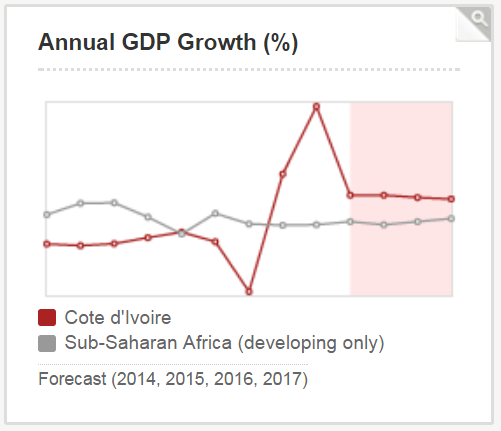Côte d'Ivoire will be an emerging country by 2020

An aerial view from a U.N. helicopter shows Plateau, the business area in Abidjan
Image: REUTERS/Thierry Gouegnon
Stay up to date:
Africa
The development objective of the Côte d'Ivoire is to transform into "an emerging country by 2020". In order to achieve this, we'll be relying on a vision of capitalism with a human face, and a coherent strategy for planning development.
To this end, the Côte d'Ivoire is implementing structural and sectoral reforms that have resulted in an average annual economic growth of more than 9% over the past four years. It is therefore in the top five of the most dynamic economies in the world and aims to consolidate its achievements.
These reforms resulted in the stabilization of the macroeconomic framework, with a budget deficit of 2.2% of GDP in 2013 and 2014, below the standard 3% of the Economic Community Of West African States (ECOWAS), a sustainable debt (less than 37%) and a rate of inflation contained at 0.4% in 2014, and that it is expected to reach about 1.7% in 2015. They have also produced some results that deserve to be highlighted, including: a ranking in the Top 10 countries reforming the business climate by the 2014 and 2015 Doing Business Reports of the World Bank Group; a ranking as the 8th most competitive African economy according to the World Economic Forum’s Global Competitiveness Report 2015; acceptance to the "Open Government Partnership (OGP)" international initiative in October 2015; B+ rating by the Fitch Ratings agency and from B1 to Ba3 with a stable outlook by the Moody's agency; obtaining Threshold in 2014 in the framework of the Millennium Challenge Corporation (MCC) and eligibility in December 2015 of the Côte d'Ivoire to the MCC Compact.

Source: World Bank
The next four years
During the 2016-2020 period, the government intends to continue structural reforms in order to create the right conditions for strengthening the contribution of the international and domestic private sector in the economy, including in the form of a public-private partnership. This will involve creating new opportunities for diversification based on its comparative advantages and the sustainable integration into regional and global value chains.
A greater impetus will be given to the processing of agricultural products (including cocoa, cashew, and cotton) through the stimulation of industrial production. The industrialization of the country will be supported by private investment, whose share in the overall investment is increasing and should rise from 65% in 2015 to 70% in 2020.
Support measures tailored to Small and Medium-sized Enterprises (SMEs) will be strengthened to enhance their contribution to GDP and to boost the creation of jobs for young people. Innovation and skill development will contribute significantly to this process by making the most of the demographic dividend.
Looking ahead to new sectors of growth
Furthermore, the Côte d'Ivoire will pay particular attention to the birth of new sectors of growth, such as renewable energies, information and communication technologies and the mass retail sector that attracts large international groups.
The continuous improvement of the business environment to make our economy one of the most attractive in Africa, or even worldwide, the enhanced attention to quality standards, the strengthening of competition and the realization of the economic potential of the land capital are areas in which we will be investing relentlessly.
It is therefore pleasing to observe that the conditions essential to the prosperity of our economy and to the wellbeing of our people are growing stronger by the day. The country has re-established political stability and the climate of peace that characterised its past reputation, following the peaceful elections of October 2015.
The Côte d’Ivoire remains very committed to the process of regional integration in order to build a common market, uniting the 15 ECOWAS countries of more than 300 million consumers. It pays particular attention to consolidating peace and security in the sub-region, while ensuring a strong involvement in common efforts to achieve the objectives of sustainable development.
We have faith in the future of our country, in the capacity of the Ivorian people to achieve the economic transformation of the Côte d’Ivoire, in the construction of a modern nation with strong institutions, for its emergence by 2020.
Author: Daniel Kablan Duncan, Prime Minister of Côte d'Ivoire. He is participating in the World Economic Forum’s Annual Meeting in Davos.
Don't miss any update on this topic
Create a free account and access your personalized content collection with our latest publications and analyses.
License and Republishing
World Economic Forum articles may be republished in accordance with the Creative Commons Attribution-NonCommercial-NoDerivatives 4.0 International Public License, and in accordance with our Terms of Use.
The views expressed in this article are those of the author alone and not the World Economic Forum.
Related topics:
Forum Stories newsletter
Bringing you weekly curated insights and analysis on the global issues that matter.
More on Forum InstitutionalSee all
World Economic Forum
May 16, 2025
Victoria Masterson, Stephen Hall and Madeleine North
March 25, 2025
Lorez Qehaja
March 19, 2025





